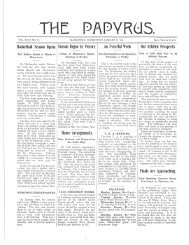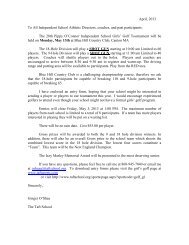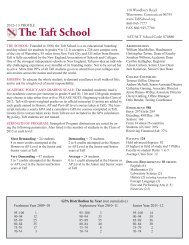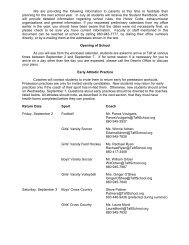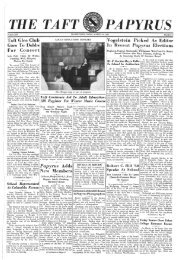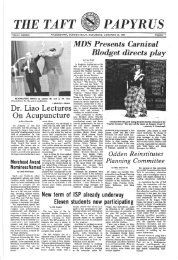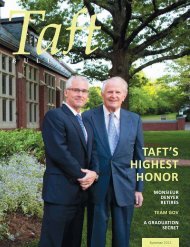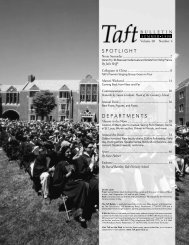Farewell to the Oddens Farewell to the Oddens - The Taft School
Farewell to the Oddens Farewell to the Oddens - The Taft School
Farewell to the Oddens Farewell to the Oddens - The Taft School
Create successful ePaper yourself
Turn your PDF publications into a flip-book with our unique Google optimized e-Paper software.
E N D N O T E<br />
<strong>The</strong> Virtues of Horace <strong>Taft</strong><br />
By Lance R. Odden<br />
With <strong>the</strong> retirement of Barclay Johnson ’53<br />
last June, I have become senior master—<strong>the</strong><br />
last <strong>to</strong> have worked for Paul Cruikshank and<br />
<strong>to</strong> have been initiated in<strong>to</strong> <strong>Taft</strong> by those who<br />
worked for Horace <strong>Taft</strong>, as well as Paul<br />
Cruikshank. My men<strong>to</strong>rs were men like Ed<br />
Douglas, Jim Logan, Harry Stearns, Joe<br />
Cunningham and o<strong>the</strong>rs who worked for a<br />
long time for Horace <strong>Taft</strong>, and <strong>the</strong>n some of<br />
<strong>the</strong> most significant but younger men such as<br />
Bill Sullivan and Len<br />
Sargent. <strong>The</strong> impact<br />
of those men was extraordinary,<br />
and I will<br />
be forever indebted<br />
<strong>to</strong> <strong>the</strong>m, as was a generation<br />
of <strong>Taft</strong> students<br />
and faculty.<br />
All this moves<br />
me <strong>to</strong> talk about<br />
our his<strong>to</strong>ry and<br />
about Horace <strong>Taft</strong><br />
in greater depth than<br />
I ever have before.<br />
Although Horace<br />
<strong>Taft</strong> retired in 1936,<br />
his influence on <strong>the</strong><br />
school remains essential.<br />
In fact, I<br />
am proud <strong>to</strong> have<br />
brought him back as<br />
a central icon for our school community, for<br />
I deeply believe his values are as apt <strong>to</strong>day as<br />
<strong>the</strong>y were 110 year ago.<br />
Raised in Cincinnati, Ohio, <strong>the</strong> son of a<br />
lawyer, judge, and diplomat, Horace <strong>Taft</strong><br />
graduated from Yale in 1883, having roomed<br />
with Sherman Thacher for several years.<br />
Trained in <strong>the</strong> classics and destined <strong>to</strong> study<br />
law, <strong>Taft</strong> often mused with Thacher about<br />
teaching and starting his own school. However,<br />
family directives pushed him in<strong>to</strong> <strong>the</strong><br />
law <strong>to</strong> prepare him for politics and service <strong>to</strong><br />
<strong>the</strong> nation—<strong>the</strong> family’s calling. Within a few<br />
years, Horace <strong>Taft</strong> rebelled, leaving <strong>the</strong> law,<br />
returning <strong>to</strong> Yale <strong>to</strong> teach classics, and earning<br />
<strong>the</strong> disdain if not disrespect of his parents,<br />
who were sure that he would soon come <strong>to</strong> his<br />
senses and return <strong>to</strong> a higher calling.<br />
After several years on <strong>the</strong> Yale faculty,<br />
Horace <strong>Taft</strong> did come <strong>to</strong> his senses, not <strong>to</strong><br />
return <strong>to</strong> <strong>the</strong> law, but instead <strong>to</strong> start his own<br />
school <strong>to</strong> prepare young men for college,<br />
preferably in New Haven. His years at Yale<br />
had taught him that a student’s fundamental<br />
character was in place by <strong>the</strong> time he arrived<br />
at college and that it was at <strong>the</strong> secondary<br />
level that <strong>the</strong> fundamental habits of heart<br />
and mind were established. A secondary<br />
school would offer a teacher <strong>the</strong> greatest<br />
influence on <strong>the</strong> next generation.<br />
From our very beginnings in Pelham Manor,<br />
New York—where <strong>the</strong> school resided for<br />
three years—through <strong>the</strong> entirety of Horace<br />
<strong>Taft</strong>’s career, he spoke of educating <strong>the</strong> whole<br />
student. While Mr. <strong>Taft</strong> believed that preparing<br />
<strong>the</strong> mind was <strong>the</strong> first responsibility<br />
of his school, he insisted that <strong>the</strong> heart,<br />
spirit, and conscience of a student were of<br />
equal importance, and that <strong>the</strong> <strong>to</strong>tality of a<br />
person’s character counted most. In this<br />
regard, he was thoroughly Emersonian, and<br />
was most assuredly influenced by Emerson’s<br />
seminal essay on American character.<br />
Horace <strong>Taft</strong> believed deeply in personal<br />
honor, a value he emphasized continually in<br />
public speeches. He<br />
said, “As for me,<br />
truthfulness or honor<br />
is <strong>the</strong> foundation.<br />
Whatever else a student<br />
is, if <strong>the</strong>y tell <strong>the</strong><br />
truth, <strong>the</strong>re is hope,<br />
<strong>the</strong>re is something <strong>to</strong><br />
build on.” From this<br />
value, evolved our<br />
honor system, so essential<br />
<strong>to</strong> our school<br />
<strong>to</strong>day, and so much<br />
at odds with <strong>the</strong><br />
world at large.<br />
“Next <strong>to</strong> honor,<br />
we have counted<br />
hard work as <strong>the</strong><br />
most important element<br />
in character<br />
training.” Indeed, he<br />
believed so deeply in hard work, that he<br />
believed it could overcome nearly every obstacle.<br />
In his speeches, he praised students<br />
with “gumption”—<strong>the</strong> ability <strong>to</strong> overcome<br />
setbacks with hard work—which was so<br />
much more important than <strong>the</strong>oretical aptitude<br />
or natural ability.<br />
Mr. <strong>Taft</strong> derived great pleasure from <strong>the</strong><br />
remarkable records his students wrote on<br />
college entrance examinations. He was always<br />
delighted by <strong>the</strong> great records of leading scholars,<br />
but he was proudest of <strong>the</strong> triumphs of<br />
those less able. How delighted Horace <strong>Taft</strong><br />
would have been with Bill Weaver, <strong>the</strong> donor<br />
38 Spring 2001



